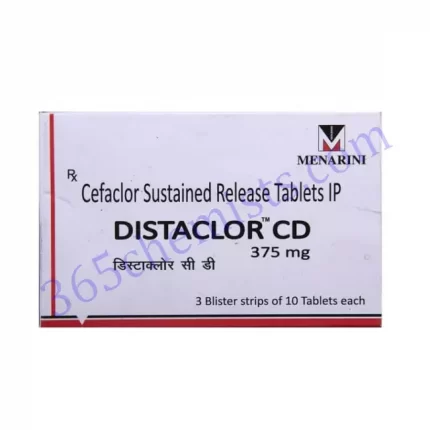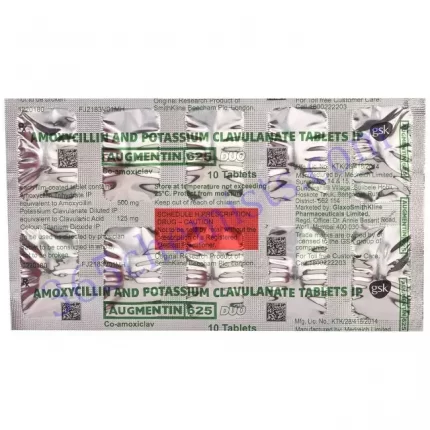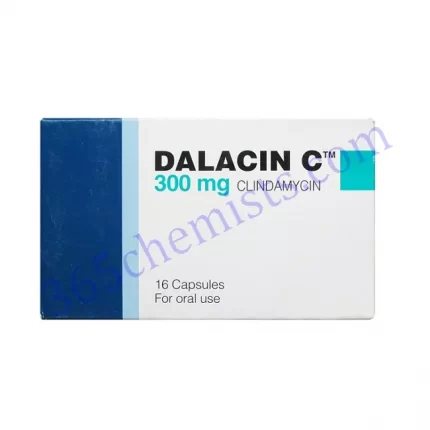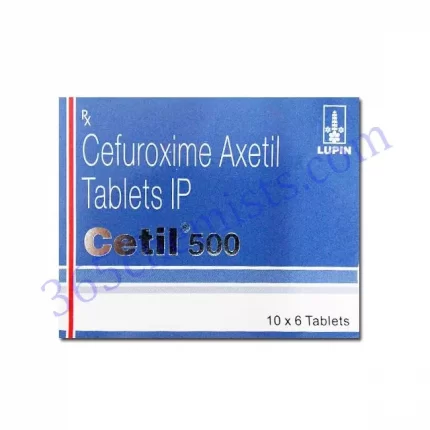Distaclor DT 250mg Tablet (Cefaclor):
A dependable antibiotic medication, Distaclor DT 250mg Tablet is used for the treatment of bacterial infections and contains Cefaclor as its active ingredient. Cefaclor is also the name of the medication’s active ingredient. This detailed explanation is meant to offer a summary of Distaclor DT 250mg Tablet, covering topics such as its mode of action, indications, dosage, adverse effects, and safety measures.
Mechanism of Action:
The Distaclor DT 250mg Tablet is classified as a member of the group of antibiotics known as cephalosporins. Cefaclor is an antibacterial medication that works by preventing the production of bacterial cell walls, which is how it achieves its antibacterial effect. The formation of peptidoglycan, an essential part of the bacterial cell wall, is disrupted as a result, which enables it to achieve this goal. Cefaclor works by interfering with the process of cell wall synthesis, which ultimately results in the death of susceptible bacteria.
Indications:
It is common practise to recommend Distaclor DT 250mg Tablet for the treatment of a variety of bacterial infections, including the following:
- Infections of the Respiratory Tract This treatment is effective against a variety of respiratory tract infections, including bronchitis, pneumonia, and sinusitis.
- Otitis Media and Other Ear Infections: The Distaclor DT 250mg Tablet can be used to treat otitis media and other ear infections.
- Infections of the Urinary Tract: It is prescribed for the treatment of infections of the urinary tract, such as cystitis and pyelonephritis, among other conditions.
Dosage
Distaclor DT 125mg Tablet
Distaclor DT 250mg Tablet
Distaclor 500mg Tablet
Distaclor CD 375mg Tablet
Dosage and Administration:
It is possible for the recommended dosage of Distaclor DT 250mg Tablet to change depending not only on the nature and extent of the infection, but also on the age, weight, and general health of the patient. It is essential to carry out the steps in the correct order as outlined by the healthcare professional who prescribed the medication. One tablet (250 milligrammes), taken every eight hours, is the typical and recommended dosage for adults and children older than 12 years old. The particular infection that is being treated will determine how long the treatment will need to be administered for.
Side Effects:
Although the Distaclor DT 250mg Tablet is generally well tolerated, it is possible for some people to experience certain adverse effects from taking it. Some examples of common adverse effects include:
- Disturbances of the Gastrointestinal Tract Some patients may experience nausea, vomiting, diarrhoea, and discomfort in the abdominal region. Consuming the medication in conjunction with food has been shown to be helpful in alleviating these symptoms.
- Allergic Reactions: In extremely rare instances, patients taking cefaclor may experience allergic reactions including rashes, itching, and swelling of the skin. If you experience any signs of a severe allergic reaction, such as trouble breathing or swelling of the face, you should seek medical attention as soon as possible.
Precautions and Warnings:
Before beginning treatment with Distaclor DT 250 mg Tablet, it is essential to take the following safety precautions into consideration:
- Because of the potential for allergic reactions, Distaclor DT 250 mg Tablet should be avoided by anyone who has a history of a severe reaction to the antibiotics cephalosporins or penicillin.
- Renal Impairment: To reduce or eliminate the risk of potentially harmful side effects, it may be necessary to adjust the dosage in patients who have severe renal impairment.
- Distaclor DT 250mg Tablet should be used with caution in pregnant or lactating women because its safety in these conditions has not been fully established. Pregnancy and Lactation: Distaclor DT 250mg Tablet should be used with caution in pregnant or lactating women.
Conclusion:
Cefaclor, the active ingredient in the antibiotic medication known as Distaclor DT 250 mg Tablet, is a tried-and-true choice for the successful treatment of bacterial infections. It accomplishes this by inhibiting the synthesis of bacterial cell walls, which ultimately results in the elimination of bacteria that are vulnerable to the effect of the drug. Infections of the respiratory tract, ear infections, and urinary tract infections are the conditions for which it is prescribed. A qualified medical professional should evaluate the patient’s condition before deciding on the appropriate dosage and method of administration. Even though the Distaclor DT 250mg Tablet is well tolerated by most people, it still has the potential to cause adverse effects such as gastrointestinal disturbances and allergic reactions. Individuals who are known to have allergies, as well as women who are pregnant or breastfeeding, should always exercise caution. The Distaclor DT 250 mg Tablet is an important component in the successful management of bacterial infections, as it alleviates symptoms and helps the patient recover faster.












